by Sheila Doucet, AAWE Paris
 I made it to the first official ceremony at COP29 early, in time to witness the slow, steady stream of activity preceding the actual curtain call. The Climate Action Network International (CAN) team begins setting up sound equipment and depending on the negotiated terms of “how to conduct an Action” (COP-speak for a protest which, even within the UN-badged Blue Zone, is negotiated between the host country and the nine officially recognized Civil Society constituencies) to mark off a space. A tiny platform appears. An immediately recognizable flashy, red, flame-eating dragon draped in a bold-lettered banner signals that you are in the right place. The small crowd of the curious and the initiated, fellow activists and Party delegates, all mingle and begin to jockey for front-line positions. The palpable anticipation notches up when you spot a Zorro-inspired masked man, attired in a skeleton suit, finishing up last-minute adjustments. He is the evening’s master of ceremonies (MC). We are ready. We await the verdict hanging heavily in the air: Which country has earned the latest “Fossil of the Day Award”?
I made it to the first official ceremony at COP29 early, in time to witness the slow, steady stream of activity preceding the actual curtain call. The Climate Action Network International (CAN) team begins setting up sound equipment and depending on the negotiated terms of “how to conduct an Action” (COP-speak for a protest which, even within the UN-badged Blue Zone, is negotiated between the host country and the nine officially recognized Civil Society constituencies) to mark off a space. A tiny platform appears. An immediately recognizable flashy, red, flame-eating dragon draped in a bold-lettered banner signals that you are in the right place. The small crowd of the curious and the initiated, fellow activists and Party delegates, all mingle and begin to jockey for front-line positions. The palpable anticipation notches up when you spot a Zorro-inspired masked man, attired in a skeleton suit, finishing up last-minute adjustments. He is the evening’s master of ceremonies (MC). We are ready. We await the verdict hanging heavily in the air: Which country has earned the latest “Fossil of the Day Award”?
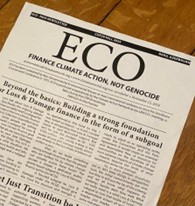 CAN, as stated on its website, is a coalition of civil society organizations galvanized by climate issues whose reach includes local, regional and internationally-based organizations. Their areas of focus range from wetlands and rainforests to solar cookers and wildlife conservation. This depth of topical expertise, guided by their vision for global sustainability and activism on behalf of communities on the front lines, allows them to speak with authority. In addition to the Fossil Awards, their free daily newsletter, ECO, circulates widely amongst negotiators, observers and media alike due to its perceptive perspective as the fly on the wall.
CAN, as stated on its website, is a coalition of civil society organizations galvanized by climate issues whose reach includes local, regional and internationally-based organizations. Their areas of focus range from wetlands and rainforests to solar cookers and wildlife conservation. This depth of topical expertise, guided by their vision for global sustainability and activism on behalf of communities on the front lines, allows them to speak with authority. In addition to the Fossil Awards, their free daily newsletter, ECO, circulates widely amongst negotiators, observers and media alike due to its perceptive perspective as the fly on the wall.
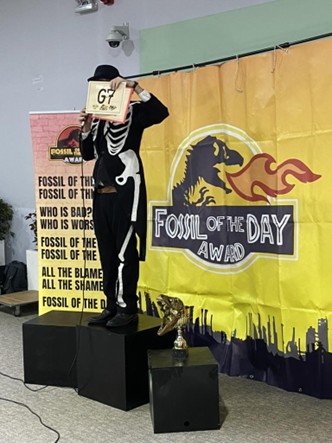 The Fossil of the Day Award emerged back in 1999 in Bonn and is the brainchild of the German NGO Forum. As quoted on the CAN website, the award singles out either a country or group of countries who “are the best at being the worst and doing the most to do the least.” The day I attended was the first of seven awards conferred over the course of the COP29 negotiations. That evening the G-7 countries – Canada, France, Germany, Italy, Japan, the United Kingdom, and the United States – collectively "earned" this unenviable distinction “for spending the past 20 years dodging, skirting and running away from their fiscal responsibility to pay up for their growing climate finance debt,” as cited in the MC’s text.
The Fossil of the Day Award emerged back in 1999 in Bonn and is the brainchild of the German NGO Forum. As quoted on the CAN website, the award singles out either a country or group of countries who “are the best at being the worst and doing the most to do the least.” The day I attended was the first of seven awards conferred over the course of the COP29 negotiations. That evening the G-7 countries – Canada, France, Germany, Italy, Japan, the United Kingdom, and the United States – collectively "earned" this unenviable distinction “for spending the past 20 years dodging, skirting and running away from their fiscal responsibility to pay up for their growing climate finance debt,” as cited in the MC’s text.
The ceremony itself is a highly choreographed affair, including a singalong “Fossil Hymn,” with the crowd enthusiastically participating, a text read by the MC providing contextual information to explain the judges’ decision and a conferral of the award itself, a bust of a dinosaur skeleton. You can read the full text shared by the MC during this specific ceremony.
As you’ve probably surmised, the Awards are consistent with civil society’s role in the UNFCCC process.
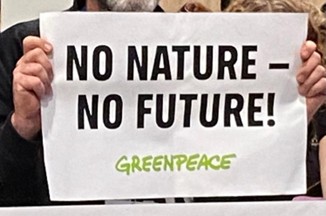 Shortly after the Intergovernmental Panel on Climate Change (IPCC) announced its mission to investigate and make recommendations regarding the scientific aspects of climate change in 1989, the UN also recognized the necessity of consulting civil society organizations. The first two loosely-organized groups or constituencies admitted were Business & Industry NGOs (BINGO) and Environmental NGOs (ENGO). This number has now grown to nine. FAWCO is a proud member of the WGC – Women & Gender Constituency – which was recognized in 2011.
Shortly after the Intergovernmental Panel on Climate Change (IPCC) announced its mission to investigate and make recommendations regarding the scientific aspects of climate change in 1989, the UN also recognized the necessity of consulting civil society organizations. The first two loosely-organized groups or constituencies admitted were Business & Industry NGOs (BINGO) and Environmental NGOs (ENGO). This number has now grown to nine. FAWCO is a proud member of the WGC – Women & Gender Constituency – which was recognized in 2011.
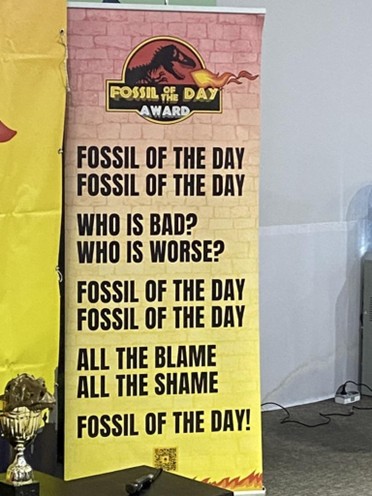 The Fossil Awards are steeped in satire, one of many tools in an activist’s toolbox when speaking truth to power. As mentioned, the award is a replica of a dinosaur skull. The jab is all the more appropriate because awardees are often a “who’s who” list of countries with oversized, historic legacies of emitting fossil fuels as they developed. Not only do they cling to their old ways, most do not publicly acknowledge that their past and current overconsumption has created today’s problems. Brandishing a shame game card is part and parcel of civil society’s role. That mission is to remind Parties (UN-speak for countries) of their duty to uphold the principles and commitments they have agreed upon in internationally negotiated treaties and agreements. Let’s recall that the United Nations Framework Convention on Climate Change (UNFCCC) is largely a consensual process. Once parties have agreed, they have a moral – although not always legally binding – responsibility to act in accordance with what has been agreed to.
The Fossil Awards are steeped in satire, one of many tools in an activist’s toolbox when speaking truth to power. As mentioned, the award is a replica of a dinosaur skull. The jab is all the more appropriate because awardees are often a “who’s who” list of countries with oversized, historic legacies of emitting fossil fuels as they developed. Not only do they cling to their old ways, most do not publicly acknowledge that their past and current overconsumption has created today’s problems. Brandishing a shame game card is part and parcel of civil society’s role. That mission is to remind Parties (UN-speak for countries) of their duty to uphold the principles and commitments they have agreed upon in internationally negotiated treaties and agreements. Let’s recall that the United Nations Framework Convention on Climate Change (UNFCCC) is largely a consensual process. Once parties have agreed, they have a moral – although not always legally binding – responsibility to act in accordance with what has been agreed to.
The Fossil Awards help cut through the weeds for negotiators and observers alike, whose days are often spent fretting over detailed, technical wording and haggling over definitions for hours upon hours.
The Fossil Awards help recenter our focus as attendees. A surprising number of messages heard at talks and panels at official pavilion side events present positions which run counter to the overarching, collectively agreed upon goal: to quickly and equitably reduce global emissions of greenhouse gas so that global temperatures will be held to 1.5 degrees Celsius. If this is the goal, then we can reasonably ask why we have yet to halt the increases? The current increase in extreme weather events is not a quirk of nature. It is the cumulative, direct result of human activities overwhelmingly generated by highly developed countries as they industrialized over the past 150 years.
IPCC reports predict that current efforts to reduce greenhouse gas emissions fall far short of the necessary effort to correct course. Governments can no longer afford to be distracted from the monumental task at hand.
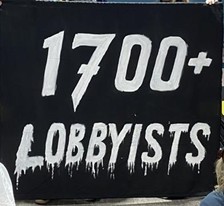 The Fossil Awards indirectly point the finger towards mainstream media spaces, which often fail to conduct deeper investigations into Party positions, motivations and actions. The Awards are highly researched. They delve into deliberately unheralded relationships or contractual agreements between parties and/or fossil fuel producers. By shining the light on hypocrisy, they inadvertently inform us about what stories we should be hearing about in our daily news feeds elsewhere.
The Fossil Awards indirectly point the finger towards mainstream media spaces, which often fail to conduct deeper investigations into Party positions, motivations and actions. The Awards are highly researched. They delve into deliberately unheralded relationships or contractual agreements between parties and/or fossil fuel producers. By shining the light on hypocrisy, they inadvertently inform us about what stories we should be hearing about in our daily news feeds elsewhere.
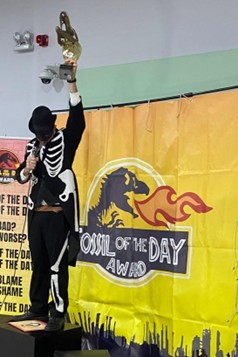 The UN conveys legitimacy to act by mandating non-state observers – be they NGOs, local governments, faith-based organizations or indigenous communities – to campaign, challenge, cajole and, by their very presence, ensure that the diverse life experiences of people around the globe are represented in the decision-making process. The Fossil Awards are only one component of these possible actions. They remind us that civil society plays a critical role in the negotiation process. By raising the curtain on what is happening behind closed doors, they shine a light upon actions which help hold Parties accountable and help the process move towards a more equitable and just decision for all.
The UN conveys legitimacy to act by mandating non-state observers – be they NGOs, local governments, faith-based organizations or indigenous communities – to campaign, challenge, cajole and, by their very presence, ensure that the diverse life experiences of people around the globe are represented in the decision-making process. The Fossil Awards are only one component of these possible actions. They remind us that civil society plays a critical role in the negotiation process. By raising the curtain on what is happening behind closed doors, they shine a light upon actions which help hold Parties accountable and help the process move towards a more equitable and just decision for all.
Hopefully, in the near future, it will no longer be necessary to single out countries who “are the best at being the worst and doing the most to do the least.”
Sources:
Climate Action Network International (CAN) website
Fossil of the Day at COP29 – Climate Action Network
Video clip from the Associated Press of the November 15, 2024 Award presented by CAN International to the G7
Background Information:
Climate Change 2022: Impacts, Adaptation and Vulnerability | IPCC Sixth Assessment Report
Timeline – 25 Years of Effort and Achievement | UNFCCC; Key Milestones in the Evolution of International Climate Policy
Non-governmental organization constituencies | UNFCCC
Photos courtesy of the author
